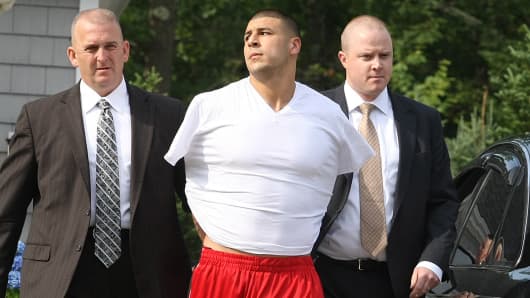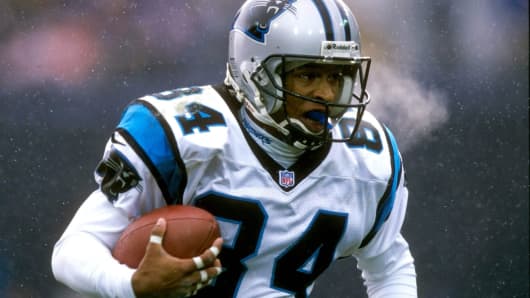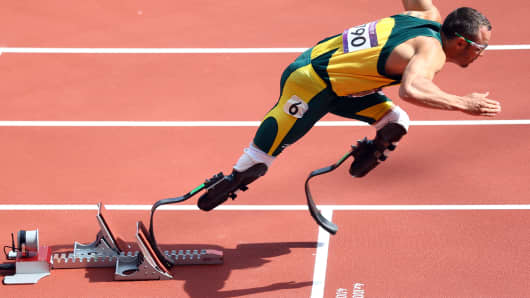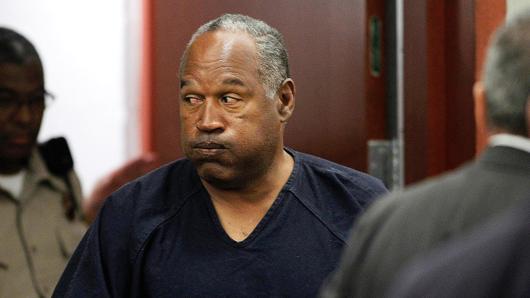Financial havoc
Apart from the tragic human toll, the negative publicity sparked by criminal allegations can wreak financial havoc.
Teams and leagues that employ them can immediately take a hit from lost ticket sales, advertisers and sponsors. Season-ticket-holders become disgusted. Sponsors run for cover, pulling ads and removing their images from marketing campaigns. If those companies are publicly traded, their share price can be affected from being in business with an alleged criminal.
Madison Avenue learned its lesson the hard way with the Armstrong and Tiger Woods scandals, said Mike "The Reputation Doctor" Paul, a crisis PR consultant.
Today's endorsement contracts have stringent morals clauses that allow companies to quickly fire athletes they believe are acting unethically, whether the athlete and his agent agree or not. In this new environment, the court of public opinion trumps all. Teams, leagues and sponsors don't wait for the facts before dropping the hammer.
Don't believe it? Take sponsors' swift reaction to the arrests of Hernandez and Pistorius.
Even when Hernandez was just under investigation, sponsor CytoSport (makers of Muscle Milk) cut him loose. Within hours of cops' slapping on the handcuffs, the Patriots jettisoned him. Within a day, Puma, dumped his contract and the league stopped selling his jersey online.
Within weeks, the Pats invited fans to trade in their No. 81 jerseys for other player jerseys. More than 2,500 fans showed up for the swap, which cost the club $250,000. Team owner Robert Kraft said the Hernandez jerseys would be ground up and recycled.
The same thing happened to Pistorius. Before Valentine's Day, he was an inspiring global sports icon making an estimated $3 million a year from sponsors including Nike, Oakley, British Telecom and French designer Thierry Mugler. Once the first headlines flashed out of Pretoria, those sponsors started heading for the hills.
A Nike ad showing Pistorius firing off the starting blocks in a race was yanked from his personal website the same day. Ironically, the copy read, "I am the bullet in the chamber." Six days after his arrest, the Swoosh announced it had "suspended" its contract with Pistorius.
(Read more: Nike suspends contract with Pistorius)
Nike was believed to be paying Pistorius around seven figures a year. The Swoosh said it does not discuss details of its athlete contracts.
"We believe Oscar Pistorius should be afforded due process, and we will continue to monitor the situation closely," said Nike spokesman Gavin Thomas.
The teams, leagues and sponsors involved had "no choice" but to immediately cut ties with these scandal-plagued endorsers, Paul said.
"That's the rule [athletes] need to remember. When you do wrong, people think of their individual reputations before yours. Every single time."
Paul said he gives all his athlete clients the same million-dollar business idea: Start your own limousine-personal security service. That way, they and their fellow jocks don't have to worry about being arrested for drunk driving. And they don't have to go "strapped," or carrying a gun, into nightclubs because they will have trained bodyguards.
He's never had any takers.
Despite the lurid headlines, the legal cases against Hernandez and Pistorius are not slam dunks. Other players have beaten murder charges.
In 2000, Baltimore Ravens linebacker Ray Lewis and two friends, Joseph Sweeting and Reginald Oakley, got into a brawl outside a Super Bowl party in Atlanta that resulted in the stabbing deaths of Richard Lollar and Jacinth Baker. The trio were charged with murder.
But Lewis' lawyers negotiated a plea deal in which prosecutors agreed to drop the murder charges in return for his testimony against his friends and pleading guilty to misdemeanor obstruction of justice. Lewis ended up with one year's probation. He was also fined $250,000 by the NFL for lying to police.
He went on to win two Super Bowls for the Ravens, including this February's Super Bowl XLVII against the San Francisco 49ers. The linebacker pocketed more career earnings at his position ($107.8 million), according to Spotrac, than any other active or retired except the recently retired Brian Urlacher of the Chicago Bears ($108.6 million.)
Now retired, Lewis is joining ESPN as a TV analyst this year. Sweeting and Oakley were later acquitted. The double murder was never solved.
(Read more: Athletes who became entrepreneurs)






